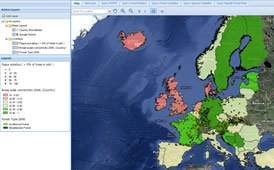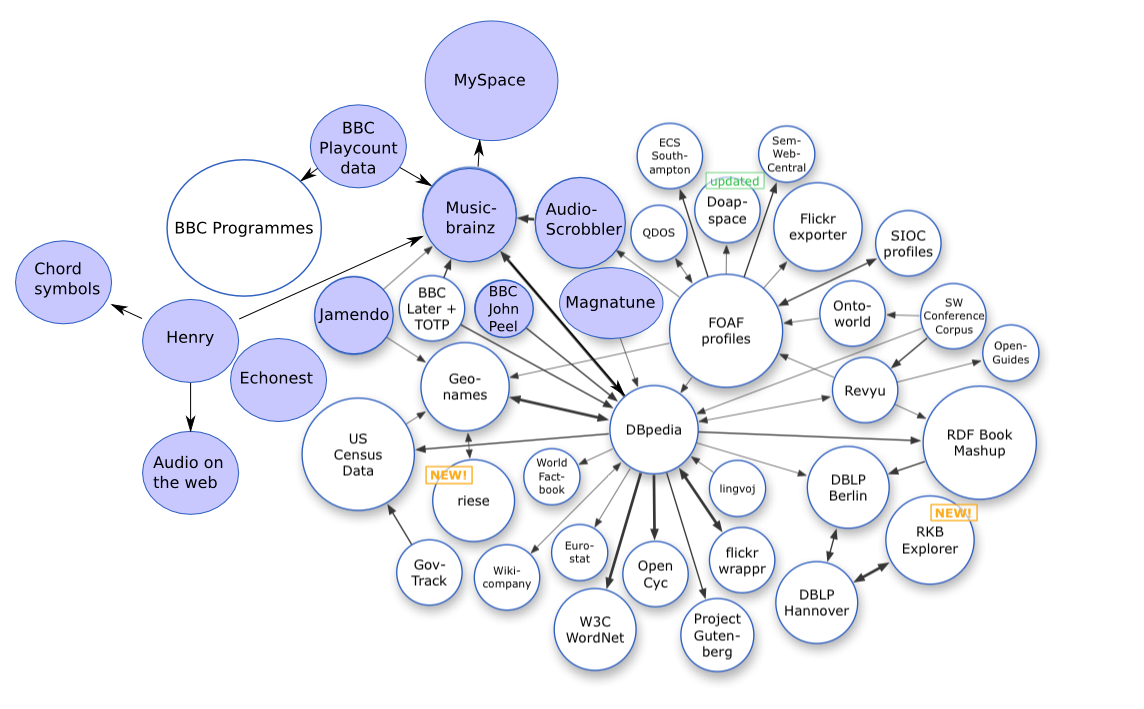|
EU Open Data Portal
Before data.europa.eu, the EU Open Data Portal was the point of access to public data published by the EU institutions, agencies and other bodies. On April 21, 2021 it was consolidated to the data.europa.eu portal, together with the European Data Portal: a similar initiative aimed at the EU Member States. Public data can be used and reused for commercial or non‑commercial purposes. The portal was a key instrument of the EU open data strategy. By ensuring easy and free access to data, their innovative use and economic potential can be enhanced. The goal of the portal was also to make the institutions and other EU bodies more transparent and accountable. Legal basis and launch of the portal Launched in December 2012, the portal was formally established by Commission Decision of 12 December 2011 (2011/833/EU) on the reuse of Commission documents to promote accessibility and reuse. Based on this decision, all the EU institutions were invited - and are still today - to publish i ... [...More Info...] [...Related Items...] OR: [Wikipedia] [Google] [Baidu] |
Public Services
A public service is any service intended to address specific needs pertaining to the aggregate members of a community. Public services are available to people within a government jurisdiction as provided directly through public sector agencies or via public financing to private businesses or voluntary organizations (or even as provided by family households, though terminology may differ depending on context). Other public services are undertaken on behalf of a government's residents or in the interest of its citizens. The term is associated with a social consensus (usually expressed through democratic elections) that certain services should be available to all, regardless of income, physical ability or mental acuity. Examples of such services include the fire brigade, police, air force, and paramedics (see also public service broadcasting). Even where public services are neither publicly provided nor publicly financed, they are usually subject to regulation going beyond that ... [...More Info...] [...Related Items...] OR: [Wikipedia] [Google] [Baidu] |
Directive On The Re-use Of Public Sector Information
Directive 2003/98/EC on the re-use of public sector information, known as the PSI Directive, Retrieved 2010-01-21 Communication from the Commission to the European Parliament, the Council, the European Economic and Social Committee and the Committee of the Regions – Re-use of Public Sector Information : review of Directive 2003/98/EC Retrieved 2010-01-21 now called Open Data Di ... [...More Info...] [...Related Items...] OR: [Wikipedia] [Google] [Baidu] |
Databases In Europe
In computing, a database is an organized collection of data stored and accessed electronically. Small databases can be stored on a file system, while large databases are hosted on computer clusters or cloud storage. The design of databases spans formal techniques and practical considerations, including data modeling, efficient data representation and storage, query languages, security and privacy of sensitive data, and distributed computing issues, including supporting concurrent access and fault tolerance. A database management system (DBMS) is the software that interacts with end users, applications, and the database itself to capture and analyze the data. The DBMS software additionally encompasses the core facilities provided to administer the database. The sum total of the database, the DBMS and the associated applications can be referred to as a database system. Often the term "database" is also used loosely to refer to any of the DBMS, the database system or an application ... [...More Info...] [...Related Items...] OR: [Wikipedia] [Google] [Baidu] |
Open Government
Open government is the governing doctrine which sustain that citizens have the right to access the documents and proceedings of the government to allow for effective public oversight. In its broadest construction, it opposes reason of state and other considerations which have tended to legitimize extensive state secrecy. The origins of open-government arguments can be dated to the time of the European Age of Enlightenment, when philosophers debated the proper construction of a then nascent democratic society. It is also increasingly being associated with the concept of democratic reform. The United Nations Sustainable Development Goal 16 for example advocates for public access to information as a criterion for ensuring accountable and inclusive institutions. Components The concept of open government is broad in scope but is most often connected to ideas of government transparency and accountability. Harlan Yu and David G. Robinson specify the distinction between open data a ... [...More Info...] [...Related Items...] OR: [Wikipedia] [Google] [Baidu] |
Transparency (behavior)
As an ethic that spans science, engineering, business, and the humanities, transparency is operating in such a way that it is easy for others to see what actions are performed. Transparency implies openness, communication, and accountability. Transparency is practiced in companies, organizations, administrations, and communities. For example, in a business relation, fees are clarified at the outset by a transparent agent, so there are no surprises later. This is opposed to keeping this information hidden which is "non-transparent". A practical example of transparency is also when a cashier makes changes after a point of sale; they offer a transaction record of the items purchased (e.g., a receipt) as well as counting out the customer's change. In information security, transparency means keeping the arcane, underlying mechanisms hidden so as not to obstruct intended function—an almost opposite sense. It principally refers to security mechanisms that are intentionally undetect ... [...More Info...] [...Related Items...] OR: [Wikipedia] [Google] [Baidu] |
Information Technology Organizations Based In Europe
Information is an abstract concept that refers to that which has the power to inform. At the most fundamental level information pertains to the interpretation of that which may be sensed. Any natural process that is not completely random, and any observable pattern in any medium can be said to convey some amount of information. Whereas digital signals and other data use discrete signs to convey information, other phenomena and artifacts such as analog signals, poems, pictures, music or other sounds, and currents convey information in a more continuous form. Information is not knowledge itself, but the meaning that may be derived from a representation through interpretation. Information is often processed iteratively: Data available at one step are processed into information to be interpreted and processed at the next step. For example, in written text each symbol or letter conveys information relevant to the word it is part of, each word conveys information releva ... [...More Info...] [...Related Items...] OR: [Wikipedia] [Google] [Baidu] |
Agencies Of The European Union
The agencies of the European Union (formally: ''Agencies, decentralised independent bodies, corporate bodies and joint undertakings of the European Union and the Euratom'') are bodies of the European Union and the Euratom established as juridical persons through secondary EU legislation and tasked with a specific narrow field of work. They are distinct from: * international law juridical persons established through primary (treaty) legislation, either as an EU institution (the European Central Bank) or an EU body of other type (such as the European Investment Bank Group entities, the European University Institute, the European Stability Mechanism or the Unified Patent Court) * other EU institutions * other EU bodies lacking juridical personality, including the advisory bodies, the independent offices held by a single person ( European Ombudsman, European Data Protection Supervisor), and the (non-independent, auxiliary) EU inter-institutional services, regardless whether ... [...More Info...] [...Related Items...] OR: [Wikipedia] [Google] [Baidu] |
Institutions Of The European Union
The institutions of the European Union are the seven principal decision-making bodies of the European Union and the Euratom. They are, as listed in Article 13 of the Treaty on European Union: * the European Parliament, * the European Council (of Heads of State or Government), * the Council of the European Union (of state Ministers, a Council for each area of responsibility), * the European Commission, * the Court of Justice of the European Union, * the European Central Bank and * the European Court of Auditors. Institutions are distinct from advisory bodies to the European Union, and agencies of the European Union. History Most EU institutions were created with the establishment of the European Community in 1958. Much change since then has been in the context of shifting the balance of power away from the council and towards the Parliament. The role of the commission has often been to mediate between the two or tip the balance. However, the commission is becoming mor ... [...More Info...] [...Related Items...] OR: [Wikipedia] [Google] [Baidu] |
European Commission
The European Commission (EC) is the executive of the European Union (EU). It operates as a cabinet government, with 27 members of the Commission (informally known as "Commissioners") headed by a President. It includes an administrative body of about 32,000 European civil servants. The Commission is divided into departments known as Directorates-General (DGs) that can be likened to departments or ministries each headed by a Director-General who is responsible to a Commissioner. There is one member per member state, but members are bound by their oath of office to represent the general interest of the EU as a whole rather than their home state. The Commission President (currently Ursula von der Leyen) is proposed by the European Council (the 27 heads of state/governments) and elected by the European Parliament. The Council of the European Union then nominates the other members of the Commission in agreement with the nominated President, and the 27 members as a team are ... [...More Info...] [...Related Items...] OR: [Wikipedia] [Google] [Baidu] |
European Union
The European Union (EU) is a supranational political and economic union of member states that are located primarily in Europe. The union has a total area of and an estimated total population of about 447million. The EU has often been described as a ''sui generis'' political entity (without precedent or comparison) combining the characteristics of both a federation and a confederation. Containing 5.8per cent of the world population in 2020, the EU generated a nominal gross domestic product (GDP) of around trillion in 2021, constituting approximately 18per cent of global nominal GDP. Additionally, all EU states but Bulgaria have a very high Human Development Index according to the United Nations Development Programme. Its cornerstone, the Customs Union, paved the way to establishing an internal single market based on standardised legal framework and legislation that applies in all member states in those matters, and only those matters, where the states have agree ... [...More Info...] [...Related Items...] OR: [Wikipedia] [Google] [Baidu] |
Open Data
Open data is data that is openly accessible, exploitable, editable and shared by anyone for any purpose. Open data is licensed under an open license. The goals of the open data movement are similar to those of other "open(-source)" movements such as open-source software, hardware, open content, open specifications, open education, open educational resources, open government, open knowledge, open access, open science, and the open web. The growth of the open data movement is paralleled by a rise in intellectual property rights. The philosophy behind open data has been long established (for example in the Mertonian tradition of science), but the term "open data" itself is recent, gaining popularity with the rise of the Internet and World Wide Web and, especially, with the launch of open-data government initiatives such as Data.gov, Data.gov.uk and Data.gov.in. Open data can be linked data - referred to as linked open data. One of the most important forms of open d ... [...More Info...] [...Related Items...] OR: [Wikipedia] [Google] [Baidu] |





